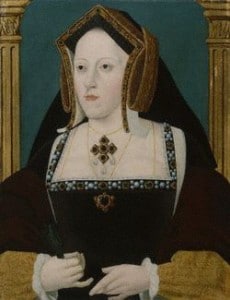
According to Eustace Chapuys, the imperial ambassador, on Sunday 12th June 1530 Catherine of Aragon had words with her husband Henry VIII, “exhorting him to be again to her a good prince and husband, and to quit the evil life he was leading and the bad example he was setting.”1
Catherine went on to tell him that even if he did not respect her, “his true and lawful wife”, that “he should at least respect God and his conscience”, and that he should not ignore the brief issued by the Pope. Catherine had applied to the Pope for this brief “for to the effect that nobody shall, under pain of excommunication, judge, allege, counsel, procure, solicit, or otherwise speak “á complacentia o gratia,” of this matter of the dissolution of matrimony between the King and Queen, unless it be as God and his conscience may dictate.”2
Unfortunately, her words fell on deaf ears and Henry simply argued that the Pope’s brief, which was urging restraint on the King, “was of very little consequence” and that there were plenty of people who were on his side. Henry then “left the room abruptly without saying another word.”
Catherine had berated her husband because although he was continuing to treat her with respect, by appearing in public with her as king and queen, Anne Boleyn was rising in prominence. Six months earlier, Chapuys had described
“a grand fête in this city, to which several ladies of the Court were invited” and how Anne Boleyn took precedence over all the other ladies, who included “queen Blanche and the two duchesses of Norfolk, the dowager and the young one)”, and that she sat by the King “occupying the very place allotted to a crowned queen”. Chapuys went on to report:
“After dinner there was dancing and carousing, so that it seemed as if nothing were wanting but the priest to give away the nuptial ring and pronounce the blessing. All the time, and whilst the carousal was going on, poor queen Katharine was seven miles away from this place holding her own fête of sorrow and weeping.”3
It must have been a horrible and heartbreaking situation for Catherine of Aragon.
Also on this day in history, 12th June 1540, the newly imprisoned Thomas Cromwell wrote to King Henry VIII from the Tower of London, asking for mercy and pleading his innocence – click here to read more.
Notes and Sources
- Calendar of State Papers, Spain, Volume 4 Part 1, Henry VIII, 1529-1530, 354.
- Ibid., 318.
- Ibid., 232.